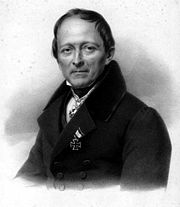
Anton Ludwig Ernst Horn
Encyclopedia

Braunschweig
Braunschweig , is a city of 247,400 people, located in the federal-state of Lower Saxony, Germany. It is located north of the Harz mountains at the farthest navigable point of the Oker river, which connects to the North Sea via the rivers Aller and Weser....
. In 1797 he received his doctorate from the University of Göttingen, and later worked as a physician at the clinical institute in Braunschweig. For a short period of time he was a professor of medicine at the Universities of Wittenberg (1804) and Erlangen (1805), and in 1806 went to work at the medical hospital at the Charité
Charité
The Charité - Universitätsmedizin Berlin is the medical school for both the Humboldt University and the Free University of Berlin. After the merger with their fourth campus in 2003, the Charité is one of the largest university hospitals in Europe....
in Berlin
Berlin
Berlin is the capital city of Germany and is one of the 16 states of Germany. With a population of 3.45 million people, Berlin is Germany's largest city. It is the second most populous city proper and the seventh most populous urban area in the European Union...
. One of his well-known students was Moritz Heinrich Romberg
Moritz Heinrich Romberg
Moritz Heinrich Romberg was a Jewish physician from Berlin who published his classic textbook in sections between 1840 and 1846; Edward Henry Sieveking translated it into English in 1853....
(1795–1873).
Horn is considered the first practicing psychiatrist
Psychiatrist
A psychiatrist is a physician who specializes in the diagnosis and treatment of mental disorders. All psychiatrists are trained in diagnostic evaluation and in psychotherapy...
at the Charité. In the early 19th century, psychology
Psychology
Psychology is the study of the mind and behavior. Its immediate goal is to understand individuals and groups by both establishing general principles and researching specific cases. For many, the ultimate goal of psychology is to benefit society...
as a scientific discipline was in its infancy, and barbaric, coercive methods were generally used to treat mental patients. Horn believed that mental illness was largely due to physical suffering, and used an assortment of mechanical devices for therapeutic
Therapy
This is a list of types of therapy .* Adventure therapy* Animal-assisted therapy* Aquatic therapy* Aromatherapy* Art and dementia* Art therapy* Authentic Movement* Behavioral therapy* Bibliotherapy* Buteyko Method* Chemotherapy...
purposes. He extensively used centrifugal
Centrifuge
A centrifuge is a piece of equipment, generally driven by an electric motor , that puts an object in rotation around a fixed axis, applying a force perpendicular to the axis...
devices such as the "rotating bed" and "rotating chair" for treatment of hysteria
Hysteria
Hysteria, in its colloquial use, describes unmanageable emotional excesses. People who are "hysterical" often lose self-control due to an overwhelming fear that may be caused by multiple events in one's past that involved some sort of severe conflict; the fear can be centered on a body part, or,...
at the Charité, and reportedly believed that his patients derived benefits from such practices.
In 1803 Horn published a practical textbook on pharmaceuticals titled Handbuch der praktischen Arzneimittellehre für Ärzte und Wundärzte. He is also credited for providing an early description of tabes dorsalis
Tabes dorsalis
Tabes dorsalis is a slow degeneration of the sensory neurons that carry afferent information. The degenerating nerves are in the dorsal columns of the spinal cord and carry information that help maintain a person's sense of position , vibration, and discriminative touch.-Cause:Tabes dorsalis is...
.
External links
- Centrifuge “Therapy” for Psychiatric Patients in Germany in the Early 1800s
- http://www.ncbi.nlm.nih.gov/pubmed/778342 NCBI; Venery, the spinal cord, and tabes dorsalis before Romberg: the contribution of Ernst Horn

